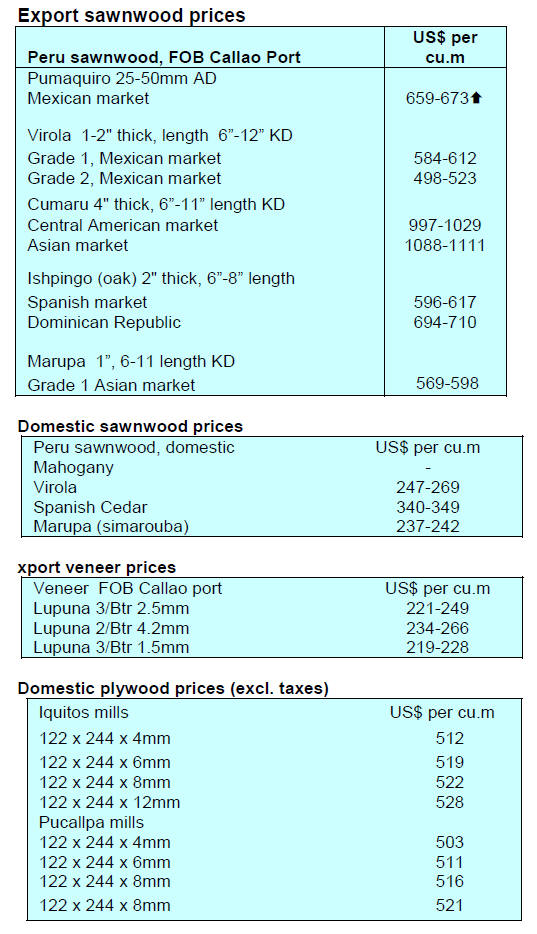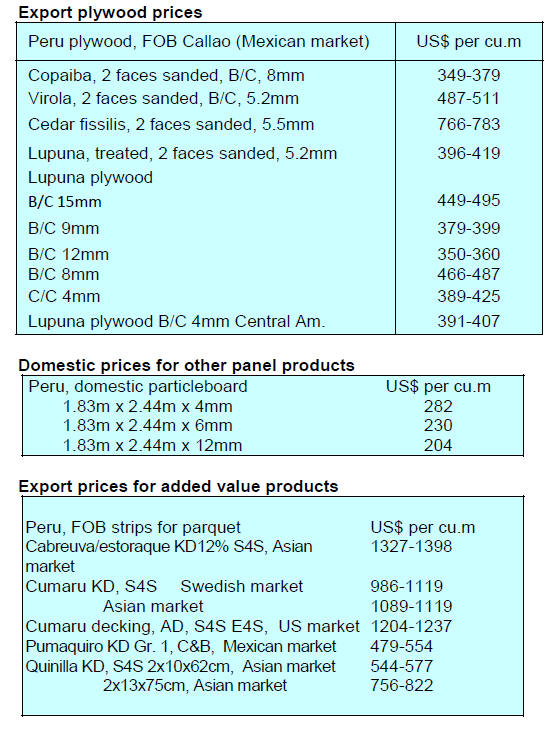WTK Holdings has indicated it will adjust plywood output
in response to weak demand in the Japanese market. In
2020 around 70% of the group’s plywood was exported to
Japan and 29% to Taiwan P.o.C. WTK said Japan
imported plywood faces tough competition from Japanese
domestic plywood.
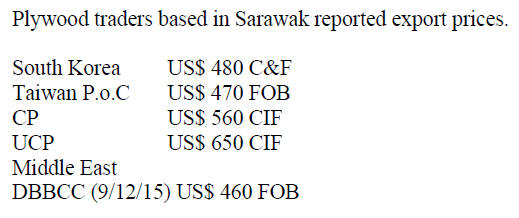
4.
INDONESIA
Furniture industry
continues to grow
Indonesia’s Minister of Industry, Agus Gumiwang
Kartasasmita, said the performance of the furniture sector
is very encouraging and as a result it will get more support
from the government.
Furniture exports in 2020 increased by around 8% from
2019 and were worth close to US$2.0 billion. Another
product that is doing well is wooden doors as Indonesia is
among the top producers after China, Canada, Poland,
Brazil and Germany.
He pointed out that in 2020 Indonesia was among the top
six door exporters to the UK, United States, Netherlands,
Australia and South Africa. The pandemic undermined
growth in the wood products sector in 2020 but now the
sector is recovering.
See:
https://jatim.antaranews.com/berita/487606/menperinindustri-furnitur-terus-menggeliat-di-tengahpandemi
MDF manufacturer optimistic on 2021 prospects
In 2020 PT Indonesia Fiberboard Industry achieved a 7%
increase in export sales over 2019 supported by increased
sales to Middle East countries where demand expanded
over 30% year on year. Company sales in 2020 were
distributed between Japan (IDR 248 billion), Middle East
(IDR 228 billion) and domestic sale (IDR1421 billion).
The company continues to be optimistic on prospect for
2021 especially as, according to a company spokesperson,
some other countries find it difficult to offer MDF from
mixed light hardwoods a common raw material for MDF
production.
Strengthen climate partnership with US
Indonesia has expressed support for strengthening a new
bilateral climate partnership with the US. The Minister of
Environment and Forestry, Siti Nurbaya, conveyed this in
writing in response to a letter from the US Presidential
Envoy for Climate, John F. Kerry.
The Minister noted that building a new climate partnership
with the US is among Indonesia's bilateral climate
priorities.
See:
https://foresthints.news/indonesia-making-efforts-tostrengthen-new-climate-partnership-with-us/
Number of fire ‘hotspots’ falls
The number of haze-casing fires during the period January
to mid-May this year has dropped. The Minister of
Environment and Forestry reported that there were 232
fire ‘hotspots’ during the period which was over 60% less
than in 2020. The Minister said fire-fighting efforts
continued despite the challenges posed by pandemic.
Trade Balance Surplus
The Minister of Trade Muhammad reported the April 2021
trade balance was a surplus of US$2.19 billion and that
this builds on the monthly surpluses reported since May
2020. The surplus in April 2021 was mainly from non-oil
and gas sectors.
See:
https://www.republika.co.id/berita/qtlsah383/neracadagang-surplus-lutfi-pemulihan-ekonom-menguat
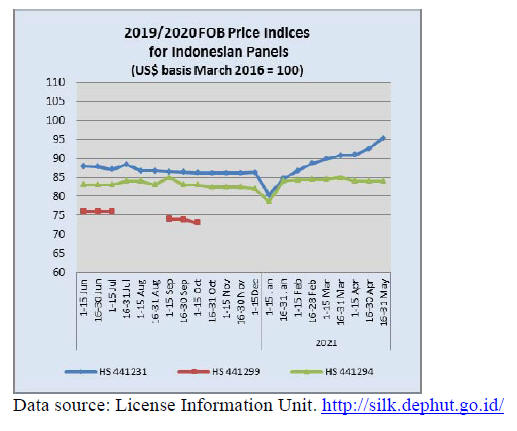
5.
MYANMAR
Myanmar reports 96 new
COVID-19 confirmed patients
Myanmar’s Ministry of Health and Sports reported
additional COVID-19 patients on 27 May bringing the
total number of confirmed cases to 143,414.
It has been reported that China has donated 500,000
Sinopharm Covid vaccine does to Myanmar which will be
administered first in badly affected areas. The ministry is
trying to make sure all health workers receive vaccine
shots. Currently, Myanmar is using Covishield and as of
the end of April over 1.5 million people have received
their first shot.
See:
https://elevenmyanmar.com/news/myanmar-to-use-chinadonated-sinopharm-covid-vaccine)
MTE Tender sales resume
The Myanmar Timber Enterprise (MTE) sold teak and
hardwood logs on 27 May 2021. This was the first sale
conducted under the new administration, the military
government. Out of 391 tons on the tender list, 340 tons
were sold for about US$900,000. The conditions of sale
specified that only finished products could be exported.
Sales were conditional on production of finished products
only if for export. As a result of this the average price
offered was lower than if mills could export sawnwood.
Since the first week of April sawnwood export licenses
were suspended.
It is understood that sawmillers and representatives of the
Ministry of Natural Resources and Environmental
Conservation met to discuss the preparation of new export
regulations. No new regulations had been released as of
the end of May.
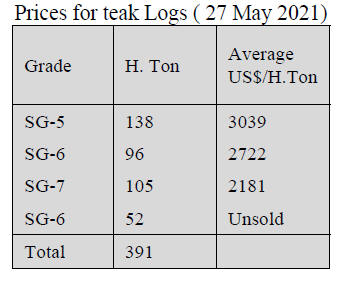
The local media (The Irrawaddy) reported that the value of
tender sale (all logs) totalled around US$1.8 million for
390 tons of teak logs, 4,030 tons of other hardwood logs
and sawnwood.
Business suspend payments to joint venture state
enterprises
The international media has reported Total of France and
Chevron of the US announced they have suspended some
payments to their joint venture with a state-owned
company.
Democracy advocates are repeatedly pressuring businesses
companies to suspend ties with the military regime and
have urged that oil and gas payments be put in a trust or
protected account until Myanmar has an elected
government.
The oil-and-gas sector is Myanmar’s largest source of
foreign exchange, earning at least US$1.5 billion annually.
See:
https://www.telegraphindia.com/world/myanmar-fossil-giantstotal-and-chevron-stop-junta-payments/cid/1816959
EU statement on recent developments
On 23 may 2021 the EU released a Statement by the
Spokesperson on the latest developments in Myanmar.
This states:
“We have heard the statement of U Thein Soe, the juntaappointed
chairman of the Union Election Commission,
according to which the Commission may dissolve the
National League for Democracy, which overwhelmingly
won the last general elections in November.
If the Commission were to proceed with this proposal, it
would show yet again the junta’s blatant disregard for the
will of Myanmar’s people and for due legal process.
The EU reiterates that the elections in November faithfully
represented the will of Myanmar’s people. This was
confirmed by all independent domestic and international
observers.
No arbitrary decision by the military junta and
their illegally-appointed members of the Electoral
Commission can cancel that.
The EU will continue to denounce all attempts to overturn
the will of the Myanmar people and to alter the outcome of
the last general elections. No repression or
unfounded pseudo-legal proceedings can grant legitimacy
to the junta’s illegal takeover of power.
Only respecting the will of the people can bring Myanmar
back onto its democratic path and deliver stabilityand
nd sustainable development.
See:
https://eeas.europa.eu/delegations/myanmarburma/98878/myanmar-statement-spokesperson-latestdevelopments_en
6. INDIA
Decisions on forests and
wildlife to be made by
Central government
Power to monitor state infrastructure projects is being
centralised to limit state government's decision-making in
issues related to forest and wildlife conservation. The
Ministry of Environment, Forest and Climate Change has
issued instructions that restrict State governments from
imposing environmental or conservation requirements for
infrastructure projects in forest areas other than what has
already been stipulated by the central government.
The Ministry has indicated that for a project to be
implemented under the Forest (Conservation) Act the
Central and State government will consult so that a
proposal can be examined and that due diligence has been
exercised.
See:
https://www.hindustantimes.com/india-news/centre-limitsstates-role-in-forest-matters-101616955823571.html
India plans heavy duties on fibreboard imports
The Directorate General Of Anti-Dumping and Allied
Duties in the Ministry of Commerce and industry has
proposed the introduction of duties on fibreboard imports
from Indonesia, Malaysia, Sri Lanka, Thailand and
Vietnam in order to effect import substitution and aid
domestic manufacturers. If approved by the Ministry of
Finance the duties will be valid for five years.
The aim of the recommended duty structure is to eliminate
the price difference between domestic and imported thick
MDF (around 70% of the MDF market) and narrow the
difference for thin boards.
Analysts comment this would help domestic fibreboard
producers replace imports which are currently estimated at
25-30% of the MDF market in India.
See:
https://economictimes.indiatimes.com/markets/stocks/news/fibreboard-import-levies-to-boost-centurygreenpanel/articleshow/82422994.cms?from=mdr
Main shippers of wooden furniture to India
Of the thirty main shippers of wooden furniture to India in
fiscal 2019, just 12 accounted for 92% of the US$850
million imported. Of the others Shippers in Vietnam saw
exports of wooden furniture to India triple in 2019 from a
year earlier.
Both China and Malaysia saw 2019 exports of wooden
furniture to India decline.
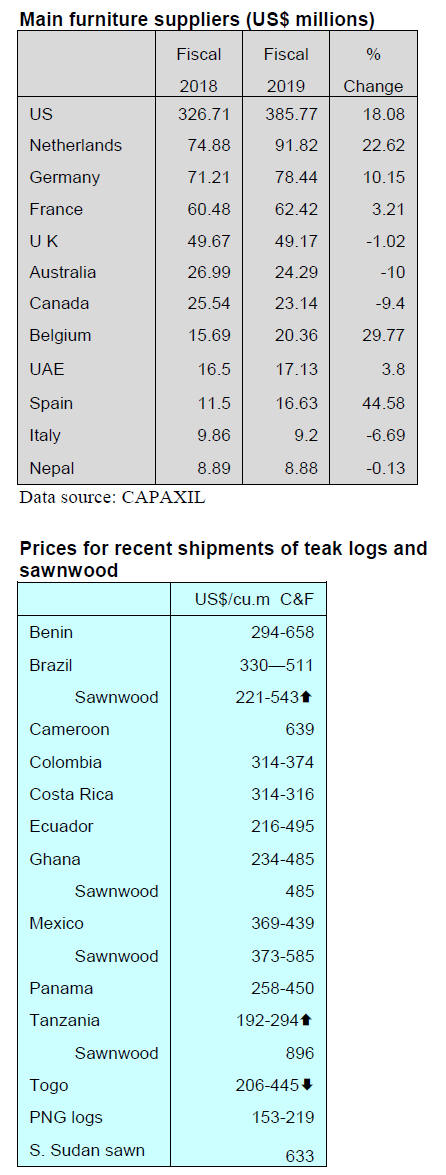
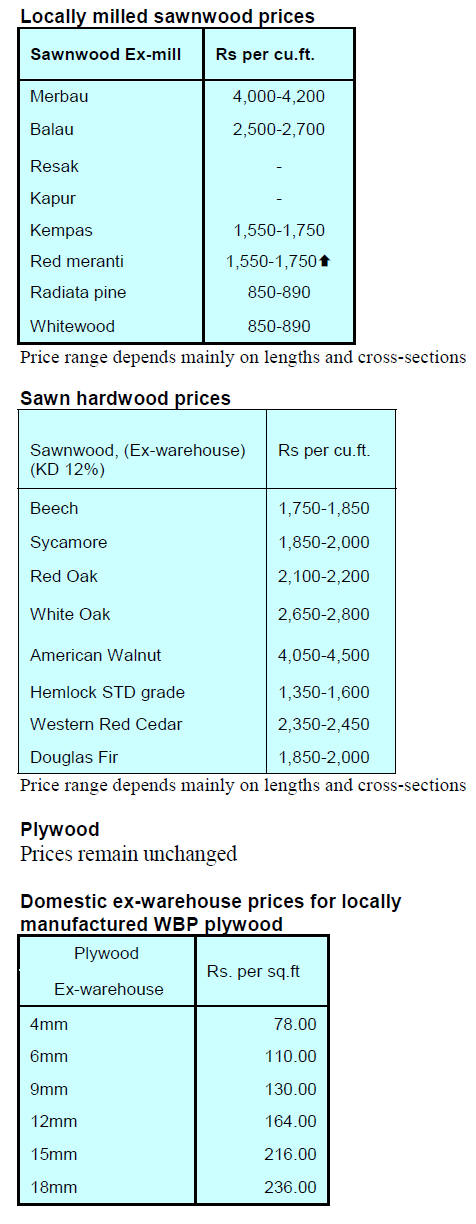
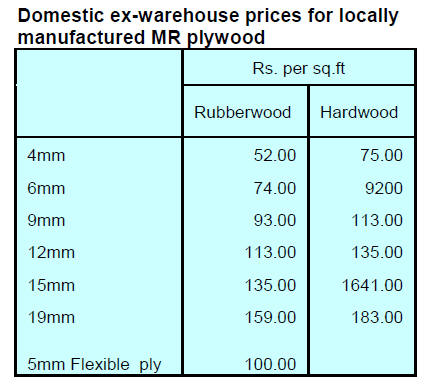
7.
VIETNAM
Impressive export growth in the first 4 months of 2021
In spite of the pandemic Vietnam’s wood and wood
product (W&WP) exports in the first 4 months of 2021
grew over 50%. At the current rate of growth W&WP
exports for 2021 could be as high as US$5 billion.
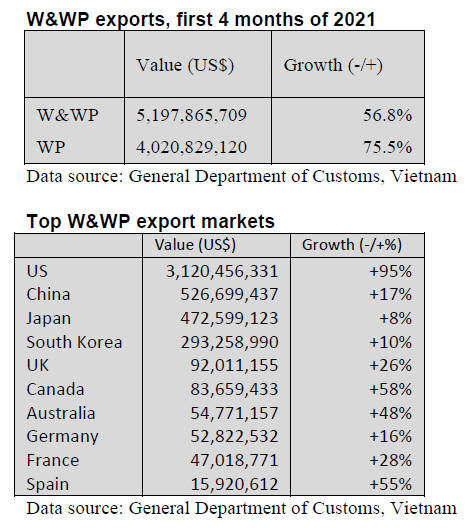
Duties on upholstered furniture
Upholstered seats originating from Vietnam are set to be
subject to an anti-dumping tax rate of 101.5% in Canada.
The move comes following the Canadian International
Trade Tribunal (CITT) preliminary investigation into
dumping.
The CITT found “reasonable indications” that dumping
and subsidised upholstered seating made in China and
Vietnam has or is threating to damage Canada’s domestic
furniture manufacturing industry. The CITT will continue
its inquiry and expects to issue its ultimate finding by 2
September. A letter from the Canada Border Services
Agency (CBSA) notified importers that provisional duties
will be collected as of 5 May.
According to details posted by the CBSA, numerous
products will be subject to anti-dumping and subsidy
duties including those with HS code 9401.40.00.00,
9401.61.10.10, 9401.61.10.90, 9401.71.10.10, and
9401.71.10.90.
Most notably, upholstered furniture originating from both
China and Vietnam will be subject to a tax rate of 295.5%
and 101.5% respectively in the Canadian market. In total,
28 Chinese manufacturers are expected to face antidumping
duties ranging from 20.65% to 226.45% while 7
Vietnamese manufacturers will be subject to duties
between 17.44% and 89.77%.
This follows the CBSA initiating an investigation in
December 2020, based on Palliser Furniture's complaint
with support from other manufacturers such as Canadian
Elran Furniture Ltd., Jaymar Furniture Corp., EQ3 Ltd.
and Fornirama Inc.
The move looks to limit the penetration of motion
upholstery and leather stationary furniture from China and
Vietnam into Canada.
Since 2017, Vietnam has maintained its position as the
largest trade partner with Canada of ASEAN members
with bilateral trade hitting US$5.1 billion in 2020.
See:
https://vietnamtimes.org.vn/canada-imposes-anti-dumpingduties-on-vietnams-upholstered-seats-31425.html
Vietnam’s wood-pellet export growing fast
Vietnam’s wood-pellet exports in the first 3 months of
2021 reached 751,000 tonnes worth US$84.6 million,
9.7% up in volume and 15% up in value over the same
period of 2020. The export price of wood pellet in the first
3 months of 2021 stood at US$112.7 per tonne, up 4.8%
over the same period in 2020.
According to Vietnam’s Ministry of Industry and Trade in
the period 2016–2020 the world wood pellet trade
expanded rapidly with an average growth rate of 14% per
year.
In 2020, global wood pellet imports are estimated at
US$4.55 billion, up 3.8% compared to 2019 and up 65.6%
compared to 2016.
In 2020 the UK was the largest consumer of wood pellets
with an import value accounting for around 38% total
world trade in pellets. Other major consumers were
Denmark, Italy, Korea and Japan.
In 2020 Vietnam's wood-pellet exports accounted for 7%
of the total world trade value of wood pellets.
In the first 3 months of 2021 almost all wood pellets
(99.6%) produced in Vietnam were exported to South
Korea and Japan. Exports to South Korea reached 444,000
tonnes worth US$44.09 million, up 2.6% in volume and
7.1% in value against the same period in 2020.
However, exports to South Korea have declined due to a
shortage of containers.
The Japanese market consumed 304,000 tonnes worth
US$40.2 million in the first 3 months of 2021, up 21% in
volume and 24.4% in value over the same period.
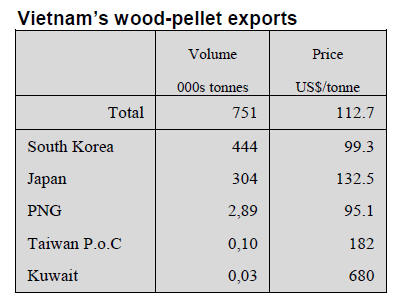
Refence log imports from Nigeria
Documents with Vietnam Customs show2020 log shipments
from Nigeria. The origin of the logs is unknown.
8. BRAZIL
Rise in inflation,
interest rates hiked
Inflation, as measured by the Extended National
Consumer Price Index (IPCA), was 0.31% in April, 0.62%
below the March rate (0.93%). The Central Bank of Brazil
(BCB) decided in April 2021 to increase the basic interest
rate (Selic) by 0.75% to 3.5% per year, the second
consecutive monthly rate increase aimed at containing
inflation.
Performance of the furniture industry
According to the Brazilian Furniture Industry Association
(ABIMÓVEL) and the Market Intelligence Institute
(IEMI) furniture production in January 2021 was 1.9%
lower than in December 2020. January export revenues for
the sector were R$7.4 billion. In January there was an
increase in domestic consumption which resulted in
manufacturers being able to raise prices. Employment
generated by the furniture industry remains at around the
same level as at the height of the pandemic.
While prospects are improving the high level of
uncertainty on the economy has resulted in fluctuating
business confidence according to the Brazilian National
Confederation of Industry and confidence in the industry
was below the historical average in February 2021.
New Standard to boost wooden frame buildings
It is anticipated that a Technical Standard (ABNT NBR
16.936, Brazilian Association of Technical Standards) on
buildings utilising ‘light’ wood frames should be
published this year. The draft text was prepared by the
Brazilian Committee of Civil Construction (ABNT/CB-
02) together with the Brazilian Wood Committee
(ABNT/CB-31) and provides guidelines for design and
execution of construction systems for ‘light’ wood frames.
The Standard establishes various requirements one of
which is that only wood products from plantation forests
or natural forests whose legal origin can be verified can be
used and applies to two story detached or semi-detached
buildings. The Standard includes reference to materials,
structural engineering design and fire protection systems
among others.
In preparing the Standard more than forty Brazilian
standards were consulted as well as international
references related to wooden frame/structures such as
Eurocode 5, ISO standards (European and American) and
the Sinat Directive 005. As result of the publication of the
standard it is expected there will be an increase in
domestic consumption of wood products.
According to the Brazilian Association of Mechanically-
Processed Timber Industry (ABIMCI) the standard will
help promote the use of wooden frame construction as a
sustainable construction method. In addition, expanding
building of wooden frame homes can contribute to
reducing the Brazilian housing deficit.
Export update
In April 2021 Brazilian exports of wood products (except
pulp and paper) increased 57.5% in value compared to
April 2020, from US$238.9 million to US$376.4 million.
Pine sawnwood exports grew 31% in value between April
2020 (US$45.6 million) and April 2021 (US$59.7
million). Export volumes increased 16% over the same
period, from 245,600 cu.m to 285,500 cu.m.
Tropical sawnwood exports increased 11.5% in volume,
from 31,400 cu.m in April 2020 to 35,000 cu.m in April
2021. The value of exports in the same period rose 14%
from US$12.6 million to US$14.4 million.
The value of pine plywood exports surged over 100% in
April 2021 in comparison with April 2020, from
US$49.19 million to US$100.9 million. Export volumes
also rose jumping 20% over the same period, from
200,900 cu.m to 241,200 cu.m.
As for tropical plywood exports increased in volume
(28%) and in value (39%), from 6,100 cu.m (US$2.6
million) in April 2020 to 7,800 cu.m (US$3.6 million) in
April 2021.
Wooden furniture export earnings increased from US$25.7
million in April 2020 to US$72.2 million in April 2021, a
181% growth in the total exports of the product during the
period.
Furniture exports jump in first quarter
The Brazilian Trade and Investment Promotion Agency
(APEX-BRAZIL) in collaboration with the Brazilian
Furniture Industry Association (ABIMÓVEL) publishes a
monthly report “Monitoring of Furniture Exports” in April
this year it was reported that Brazilian exports of furniture
grew by 34.5% in the first quarter 2021.
In March 2021 wooden furniture exports grew by 37%
compared to the previous month. The main destination
was the United States where exports jumped 32% in the
first quarter of 2021.
Brazil's trade ties with Chile have grown and Brazilian
furniture exporters have benefitted as there was an over
180% rise in furniture exports in the first quarter 2021.
Two other South American countries have also
strengthened trade relations with Brazil, Uruguay and
Peru. Furniture exports to both countries are growing.
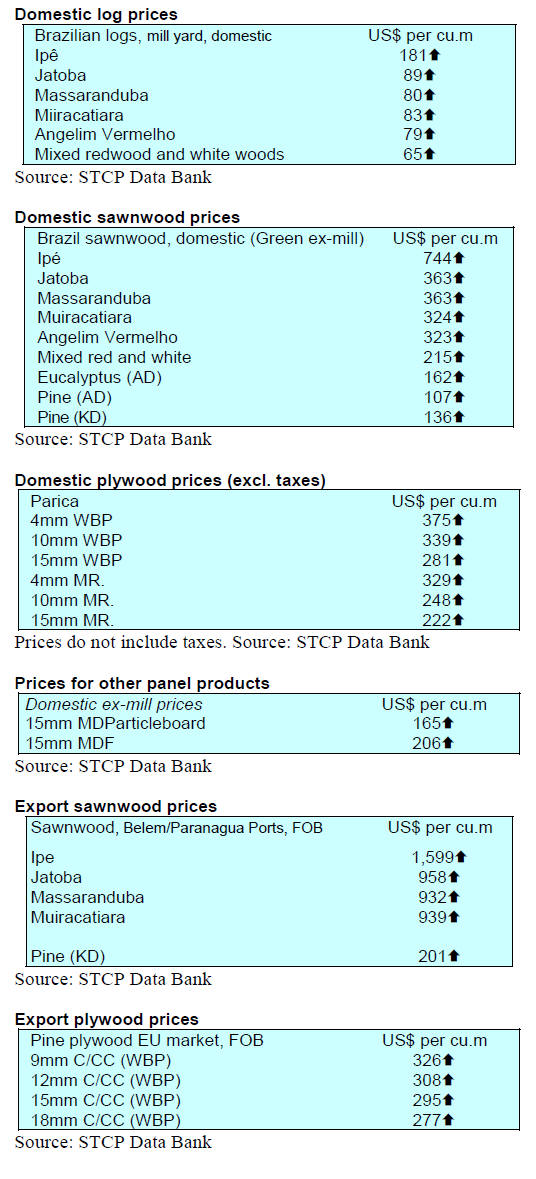

9. PERU
Five year sustainable
management programme
The ‘Program for the Promotion and Sustainable
Management for Forest Production’ will be implemented
over around 5 million ha. in nine regions of the country
over the next five years. It is anticipated the programme
will generate over 50,000 direct and indirect jobs in
Ancash, Cajamarca, Huánuco, Junín, Loreto, Madre de
Dios, Pasco, San Martín and Ucayali.
The Ministry of Economy and Finance has received a
financial contribution from the German Development
Bank, Kreditanstalt für Wiederaufbau (KfW) for a sum of
euro 6 million to partially finance the investment
programme. The programme will be executed by the
National Forest and Wildlife Service (Serfor).
This programme is expected to generate as much as
US$500 million in private investment. The Ministry of
Agriculture envisions that through this programme around
70 million ha. of the country will be zoned for planning
purposes.
Boost for the forestry sector
In order to develop and implement a communication
strategy for the forestry sector a meeting was held between
the Association of Exporters (ADEX), the Commission for
the Promotion of Peru for Exports and Tourism
(PromPerú) and WWF. The meeting discussed issues such
as the need to communicate good forestry practices
implemented in the timber sector emphasising industries
are core stakeholder in the sustainability and conservation
of Peruvian forests.
Forest products movement regulation from Serfor
The National Forest and Wildlife Service (Serfor)
approved regulations for the Control of Timber Forest in
Land Transportation in order to strengthen measures
against illegal logging and the illegal timber trade in Peru.
The document standardises the means to control the
movement of forest products. It is envisioned that the
Regional Forestry Authorities will man checkpoints.
The regulations are mandatory across the national territory
and define the activities related to the verification and
presentation of the required documentation such as the
requirement to the carrier of the Forest Transport Guide
(GTF) and other documents that support the movement
mobilization and prove the legal origin of forest products.
This measure seeks to further promote the legal trade in
the wood products in the national and international
markets to ensure the sustainable use of the country's
natural resources.
Composite panel imports surge in the first
quarter
Peruvian imports of composite panels (PB/MDF) reached
US$37.5 million in the first quarter of 2021 versus
US$24.4 million in the first quarter of 2020, a record level
for the first quarter of a year.
Ecuador was once again the main supplier of PB/MDF to
Peru in the first quarter of 2021 with shipments worth
US$14.5 million a 37% year on year increase. Spain
ranked second with US$10.4 million, an increase of 152%
compared to the US$4.2 million shipped in the first
quarter of last year.
Brazil, with a notable growth of 127%, was the third
supplier country in the first quarter of this year at US$6.1
million, versus US$3.1 million in the first quarter of last
year. Chile followed with US$3.0 million a drop of over
50% year on year.
